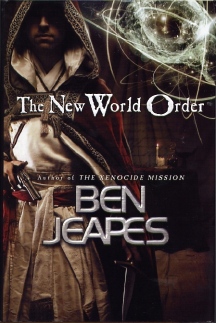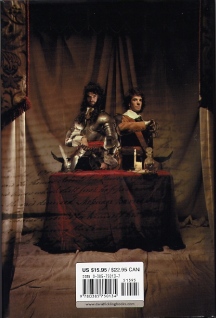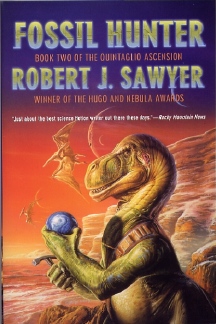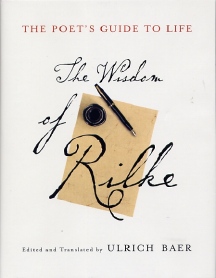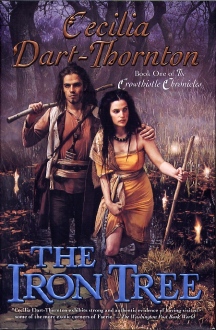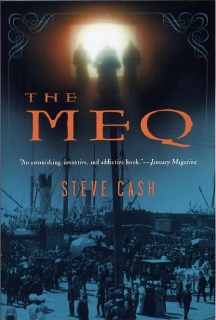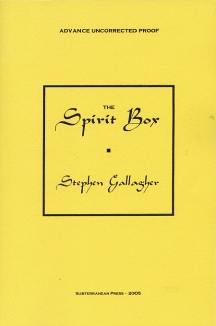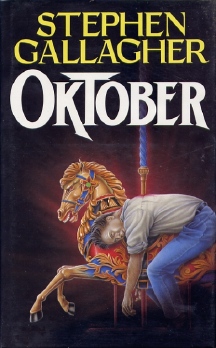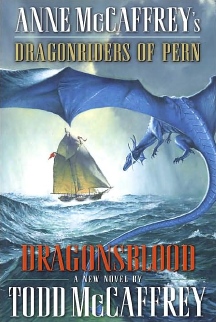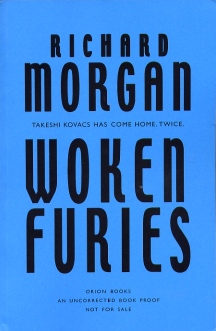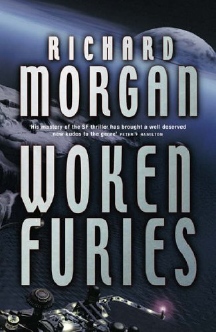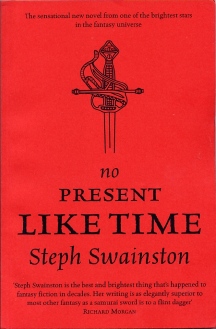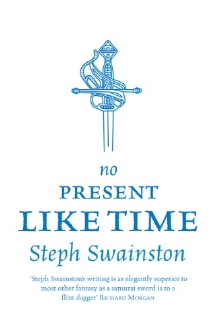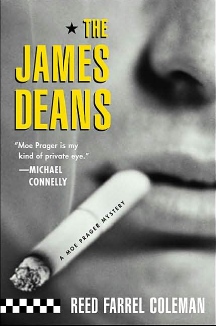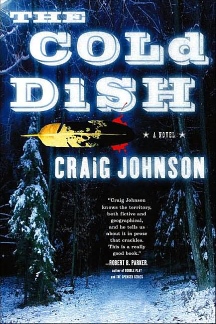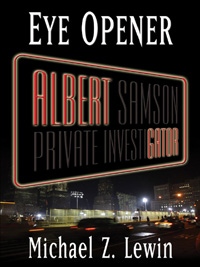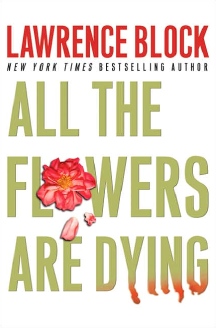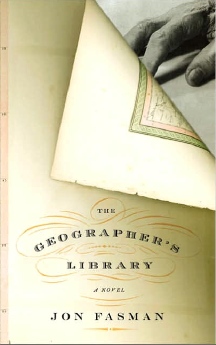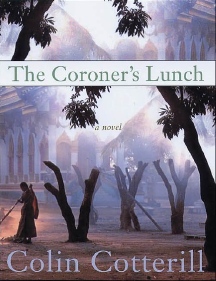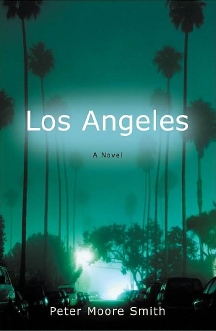|
|
|
This Just In...News from the Agony Column
|
03-11-05: Ben Jeapes Uncovers 'The New World Order'; Robert J. Sawyer's 'Fossil Hunter'; 'The Poet's Guide to Life: The Wisdom of Rilke' |
||||||
YAltHist
The fact is that everyone over, well a Certain Age, is willing to think of themselves as a Young Adult, especially when it comes to reading matters. Trust me, they aren't selling all those Harry Potter books to teenagers. Moreover, the difference between so-called "adult" books and hard-labeled Young Adult books is often just a few repetitions of the F word and graphic scenes of what Alex from 'A Clockwork Orange' calls "the old in-out". Since both are often spurious to the main themes and, uh thrusts of the story, well, more and more publishers are offering books that cater to both audiences -- those increasingly rare actual Young Adults willing to drop their video controllers and pick up a dinosaur blog (IE, book), and the Young (at heart) Adults who are perfectly willing to read stories the dont include either the F word or extraneous descriptions of Alex's favorite pastime.
Well, it's a good thing that Jeapes uses aliens to alter history, because I can attest by virtue of my own utter ignorance that had he merely shuffled the players about on the field of actual English history this English literature major might have had a difficult time detecting what was alternate and what was history. But with aliens on the scene, well, I've got to presume that any events involving them are not in the actual history books, unless you count those by David Icke. That's probably a rabbit hole you don't want to go down, though I'm loathe to totally discount the idea that the Royal Family and most of the current US Administration are actually lizard-aliens in disguise. Thankfully, the author does provide a postscript in which he tells us which events actually happened, thus preserving the history-lesson function of the book, for those who need one. Which is, judging by current events, most of the human race. That said, I find myself wondering just who the intended audience for this might be. Yes, I can imagine that young'uns who might be persuaded to look away from the Empty Vee might read science fiction, but alternate history -- and alternate early English history at that -- seems a bit of an odd choice. Adults, or at least those of us who can legally purchase liquor in any of the fifty states and even abroad, are much more likely to enjoy this sort of thing. Now, I can't say that I'd enjoy it more if the F word popped up now and again, and I'd probably enjoy it less if gratuitous sex were a part of the narrative, but my eyes will certainly welcome the print that is just a tad larger than the usual headache-inducer, and as for the very nice price tag, well that's the minus that's always a plus. The upshot is that I'm finding as I write that this new genre I'm calling YAltHist -- as exemplified in 'The New World Order' -- might just be a genre that comes as close to auto-buy status as the still-unbeatable books-about-monsters genre. And come to think of it, since this one has aliens in it, well, it's in that genre too. Sold! |
||||||
Escape
from the Vault
But like many novels written in an author's youth, these may actually have a wider appeal to some readers than his current hits. Yes, it's certain that Sawyer's a bona-fide Name Brand these days, but then, it's also certain that Name Brands put off a certain segment of readers, and I may be part of that segment. Were one to rebel against the high-minded and the serious to select the light-hearted and the fun, then one might be well advised to begin, or continue that rebellion with this, the latest in the re-release of Sawyer's series. 'Fossil Hunter' is something of a pun here, and a pertinent pun at that, as our nation embarks on cultural wars pitting science against religion. Sawyer's series envisions a planet inhabited by intelligent dinosaurs, evolved from ancestors snatched from the earth before they became extinct. Toroca, a Quintaglio geologist, finds himself in hot water as he struggles to 'splain the remains of the ancient starship that brought them all here in the first place. One hopes that the starship was intelligently designed. Tor is really doing readers who just twigged to Sawyer's talent a favor with the re-issue of this vault series, as these are nice editions at a good price. Moreover, you can actually find them. And, as all re-releases do, they harken to matters in the future, for once this mine has run its course, there are other Sawyer nuggets out there. One just hopes that we dont come to the point where were finding human footprints and dinosaur footprints in the same strata. |
||||||
Thinner Than You'd Think, Thicker Than You Deserve
Translated by Ulrich Baer, who edited '110 Stories: New York Writes After September 11', 'The Poet's Guide to Life' is nicely organized to allow the reader to effortlessly surf and search for the perfect Rilke quote to anoint that essay, soothe the troubled mind, illuminate the fictional quest of fictional characters or merely provide a perfect finish to Another Day ™. Baer starts us off with an overview of the poet's life, a brief biography. He discusses Rilke's worldview and his aesthetics, "Mindfulness in Rilke", his literary reception and the translator's own challenges. And he does so in a brief 45 pages. This in itself may be worth the price of admission -- and may itself be the price of admission for those unfamiliar with the poet's work. But it's a price well worth paying for it sets up the following 200 or so pages beautifully. What follows is Rilke Excerpted, organized by subject, theme and content. For the academic, the scholar or one of those born every minute (and these days that's not as frequent as you think), the sections offer a chance to experience the writer in brief, to dip into his limpid style, his brilliant clarity of thought without having to digest entire poems, works, or essays. The value here is crystal clear. You get enough Rilke to cover just about any potential Rilke requirement, but not so much as to make the book fearsome to even approach. The themed sections include "Life and Living: You Have to Live Life to the Limit", "Work: Get Up Cheerfully on Days You Have to Work", "Difficulty and Adversity: The Measure By Which We May Know Our Strength" and "Language: That Vast, Humming, and Swinging Syntax" -- among many others. Whether you seek solace at the end of a hard day or something pithy to pummel your intellectual opponents with, you're likely to be able to find it here and easily. Moreover, it's not daunting-looking nor is it daunting to read. It's Rilke, and Baer wisely lets Rilke speak for himself. As will I, with a quote I spent thirty seconds to locate: "It is contrary to nature to part with books with which one agrees." |
|
03-10-05: Steve Cash 'The Meq' and Cecilia Dart-Thornton 'The Iron Tree'; Stephen Gallagher Opens 'The Spirit Box' |
||||||
American
Appearances
But one must wonder about the cover art stylings done by Gordon Crabb. Now this is a wonderfully done hyper-realistic painting and it does in fact illustrate a scene from the novel. But readers enjoy fantasy for well, the fantasy of it all. And while the hyper-real incarnation of J. R. R. Tolkien's 'Lord of the Rings' as a film is assuredly a modern masterpiece, I can't help but think that an inclination to render all fantasy so realistically misses the point. To me, the two folks on the cover here look like they got lost on the way to the bathrooms at Lollapalooza. But having them depicted in such concrete terms robs me as a reader of the chance to imagine them myself, which is, one would think the point of fantasy fiction. While all fiction involves fantasizing, fantasy fiction does so more explicitly than other types. When you take that away, you remove a portion of the pleasure of reading. Of course, while I'm opining away, I'd also be inclined to opine that this cover does have a lot in common with the average romance novel cover, and that there's a good chance that the two audiences have some overlap. But for my tastes, I'd much rather see a hyper-real vision of some of Dart-Thornton's well-researched monsters. There I go again, pining for monsters. You should know well enough by now that I'm going to do so. But for all other purposes, if you're inclined to indulge in series fantasy, Dart-Thornton is known to provide the goods. Still, one hopes those folks on the cover dont have to find the concession stand on their way back to the concert.
I have to admit this sort of secret history novel is very intriguing to me, but I'm also cautious about starting series that never follow up. I have to thank Cody Cash then, who wrote me last month to tell me that, "The Meq is a trilogy, and the good news is that Random House bought all three books....The second one is currently underway (about 2/3 of the way done), and he'll be moving onto the third very soon after." So readers who want to start a series about a race of immortals who live among us -- but dont want to bore us with a diet history consisting of one bloodbath after another -- should definitely consider picking this one up. We'll try to keep up with these USAian appearances of novels that originated in the UK. There are some stellar titles out there waiting in the wings to appear on our independent booksellers' shelves, and because they first show up in the UK, there might not be enough excitement in the publicity department. Moreover, it gives us a chance to enjoy the sight of dreadlocked twenty-somethings slopping through a swamp. One is inclined to think that they'd be much more prone to rashes and bites than their unblemished skin suggests. Not to mention leeches. Perhaps this is a leechless swamp. After all, this is a fantasy. |
||||||
Experimental
Drug Fiction
As to what type of fiction it might be, well, let's classify it under "Experimental Drug Fiction" which is not like either "Drug Fiction" or "Experimental Fiction", though these two categories can have a number of similarities. While Drug Fiction and Experimental Fiction share a propensity for hallucination, Experimental Drug Fiction shows a propensity for hallucinatory drugs as opposed to the hallucinations. Gallagher has been down the Experimental Drug path before with his novel 'Oktober'. In that novel, protagonist Jim Harper has the good fortune to die in the vicinity of a small research station owned by the Risinger-Genoud drug company. Or does he? You'll turn the pages at a rapid clip to find out. His latest novel involves the theft of an experimental drug from the titular "spirit box", which is not -- as you might expect -- something like one of those ghosts-in-a-jar that you see on E-Bay. No, a spirit box is instead simply a lockable case in which a gentleman keeps his very expensive liquor. Yes, it's that kind of spirit.
Gallagher has also covered the father searching for his daughter ground quite effectively in his novel 'Rain'. At a stripped-down 276 pages, 'The Spirit Box' looks to combine a couple of themes that Gallagher has done well with in the past and send the reader on a red-hot ride down page-turner lane. Moreover, Gallagher creates convincing characters the reader comes to care about. You'd want to read about Gallagher's people if they did nothing more exciting than sit down for a family dinner. That he creatively puts them in mortal danger is just icing on the cake for that family dinner. And one of the appeals of Experimental Drug Fiction -- which tends to emphasize thrills and chills -- is that it usually offers at least one nice hallucinogenic passage amidst all the running about and shooting. Given that there is clearly some science fictional material happening in this novel, I'm pretty sure that there will be some accompanying hallucinations, and not just on the part of readers who stay up all night to finish it. |
|
03-09-05: Dragonsblood by Todd McCaffrey; Victor Gollancz Double Play: Richard Morgan's 'Woken Furies' and Steph Swainston's 'No Present Like Time' |
||||||
| Keeping
it in the Family by Stephanie Cage
Todd is one of the few authors permitted to make use of the complicated world, history and characters created by Anne McCaffrey since the publication of the first Pern novella, 'Weyr Search' in 1967. The other is his sister Georgeanne Kennedy. Cynics may suggest that one reason for this is the understandable desire to keep royalties in the family, but it's hard to deny that Todd is impeccably qualified in his own right. After all, he grew up alongside Anne McCaffrey's beguiling heroes and heroines; has been attending sci-fi and fantasy conventions for most of his life; and numbered Asimov and John W Campbell among his early acquaintances. As Todd Johnson, he's written screenplays, novellas and a novel-length role-playing game book, while as Todd McCaffrey he's already co-authored one Pern novel ('Dragon's Kin') with Anne McCaffrey as well as writing 'Dragonholder' (a sort-of biography) and acting as 'Pern Consultant' on the tie-in Role-Playing Games. Furthermore, there seems to be no end to the man's talents. A quick glance at the biography on his website reveals that, and that as a former pilot and engineer, he's well placed to bring a little more science to the series, which has always perched uncomfortably on the boundary between SF and fantasy. A large part of 'Dragonsblood' takes place in the Third Pass, when the science which created the telepathic dragons, the ferocious watch-whers, and their cute cousins the fire-lizards, is still more or less remembered. This makes the book different from most of the earlier Pern books, where science had been largely replaced by a complicated set of traditions and mythologies. Where the early books thrived on poetry and song, 'Dragonsblood' draws instead on medical lore: a quick flick through the book reveals references to antibiotics, sutures, genetic manipulation and even a passing reference to encryption. This is a contemporary scientist's take on what began as a very mediaeval world, not to mention a masculine interpretation of a world created by a woman, so it's not surprising that, although faithful to all established Pern lore, it takes a rather different flight path than the early Pern books. However, keen readers may have noticed the shift in direction already, because Todd's influence began earlier than 'Dragonskin', with a discussion between mother and son after 'All The Weyrs of Pern' resulting in some ideas which McCaffrey senior picked up and used in 'The Skies of Pern'. 'Dragonsblood' is far from Todd's first foray into Pern, but it is his first solo flight, and reactions so far suggest that the McCaffrey family and their fans have plenty to look forward to. |
||||||
Come
the Revolution
One of the most enjoyable aspects of science fiction is the reader's ability to question the worlds created by our favorite authors. So, as much as I love the world created by Richard Morgan in his Takeshi Kovacs books, which include his first novel, 'Altered Carbon' and his second novel, 'Broken Angels', I have to admit that I had a few questions about the edges of this world. After all, we've heard quite a bit about Harlan's World, and even seen a bit of it. But we've not visited Kovacs' home world for any notable length of time. Moreover, one has to wonder about the setup in these novels. OK, the deal is that human memories are recorded and stored in a cortical stack. You can be killed and resurrected in a cloned body, perhaps a clone of your body or a clone of someone else's body. Cortical stacks can be copied and even transmitted (slowly) over interstellar distances. Copied? What the heck? Well, what happens when things get mixed up? I mean, did Morgan even consider that? Wouldnt that mean you could walk into a different version of yourself? Yes, you sure could. And that's precisely what happens in Morgan's latest novel, 'Woken Furies' (Victor Gollancz / Orion House ; March 17, 2005 ; £9.99). Look, I checked the price folks, and that £9.99 is right, and it's damn amazing, considering this is the latest and most-eagerly awaited novel by Morgan. Gollancz and Orion are going a long way to make this one a UK bestseller and damn I hope they succeed. Because this looks to answer a lot of questions, about Harlan's World and about what happens when you meet up with another version of yourself. It appears that this was something Morgan had in the queue for a long time, and seeing him meet the challenge head-on offers readers one of the great pleasures of great science fiction.
My hope is that most of my readers already have this on order from the usual suspects. And if you're like me, you're getting two copies -- the reading copy, which may or may not be signed, and the signed keeping-no-touching copy. I still have copies of the second variety in paper, unopened of Morgan's first three novels. Hopefully, my kids wont have to sell them to fund a Quellist Rebellion here in the US of A. But if it's called for, we're prepared. And in that case, I must admit to being rather sad that I've missed the whole cortical stack technology. In my time as a SysAdmin, one thing I was definitely known for were the backups. Heck, I pulled files off a tape I made of the data on a computer de-commissioned before I even started working for the company that owned the computer. I brought the damn thing back to life, sucked out the data and put it on the scrapheap. Then again, maybe I dont want someone to do that to me. I do hope they read the book before selling it. Viva la revolution! |
||||||
Pawns on Drugs
The pre-teen me who lined up to see '2001:A Space Odyssey' in Cinerama could hardly have conceived of saying that, let alone having lived it in reference to the genre of the movie he was seeing. I thought I'd be looking back on an age of manned space exploration, peace and plenty, not a scarred, scorched Earth with a yawning, growing luxury gap. Who could have imagined the fantasy fiction that one would find in a science fiction world? As it happens, Steph Swainston's 'The Year of Our War' might be exactly the kind of fantasy fiction youd have hoped back then to find in the science fictional future. Urban, urbane, witty and densely weird, Swainston's first novel was different and strange enough to achieve escape velocity from a genre comprised primarily of guys fighting one another with swords. With 'No Present Like Time' (Victor Gollancz / Orion House ; April 2005 ; £9.99), Swainston returns to the Fourlands and to Jant, the winged addict who stepped between the lines of reality in the previous novel. Alas for Jant, his current reality, five years after having stopped the swarms of Insects, offers more than enough challenges. While reconstruction is going too slowly, everything else is going too fast. His wife appears to be having an affair, and he's been displaced since a brilliant newcomer has joined the Circle of Immortals that runs the Fourlands. But worse things are always waiting, aren't they?
And, like Morgan, Swainston has a ready answer for those of us who might have wondered whats going on in the world at large, beyond the Fourlands she so surreally described in her first novel. It appears we'll get to journey there in the follow-up. Unfortunately, our journey wont be accompanied by another gorgeous Edward Miller / Les Edwards painting. I'm looking now at my copy of 'The Year of Our War', which Terry D'Auray picked up for me on one of her trips to 'M for Mystery'. I've still got the signed copy in the plastic bag it came in. It's really a beautiful painting and to my mind something of shame that Gollancz has gone for the austere look in this newest novel. Well, if we lose an Edward Miller painting, at least we gain a new novel by Steph Swainston, and that goes a long, long way to compensate. And to remind us that no matter how much I like to obsess and observe the cover art of the novels I love, when it comes to reading...there are only words. |
|
03-08-05: A Conversation With Steve Erickson |
|||
Accepting
Chaos
Thankfully that was not all there was. Sandwiched between the slabs of twenty-something angst was a strange and surreal slice of science fiction titled 'Days Between Stations'. The author, one Steve Erickson, had a penchant for evoking the dislocated feeling of being adrift in a chaotic world swirling with change, a world constantly edging beyond comprehension. In the novels that followed, he repeatedly decimated the city of Los Angeles, he told the story of Hitler's pornographer, and he created world after world, worlds like ours but not ours. His writing occupied a no-man's land between literary experimentation and borderline genre fiction. There was only one way to read this stuff. I plunged in headfirst, immersed, and read it as fast as possible. It was, after all science fiction. My immersive inclinations were rewarded with a re-creation of our world, our lives, after a chaotic cataclysm, clearly recognizable, but re-arranged with an alien, asynchronous logic. One of the pleasures of reading science fiction is putting together the world in your head as you read the novel. Usually, you do this in a rigorous fashion. The real joy, however, is not putting the world together; it's the state you experience just before you put it all together, when the possibilities are swirling in your mind. But with Erickson's work, it's better to let all the details gather around in a blur, to let the world remain in soft focus. There's a sense of melancholy and angst, to be sure, but Erickson is also having as much fun as a boy can; he's taking apart the world and putting it back together according to his own feelings. Erickson's books don't come off the assembly line on a regular, annual basis. Each time a new book appears, we have to snatch it up, rip through it and then we have to go back and fit it in with the rest of his works. His latest novel, 'Our Ecstatic Days', is no exception. And it does slot in with the rest of his oeuvre, particularly his previous novel 'The Sea Came In At Midnight'. When 'Our Ecstatic Days' showed up on the radio station shelves, my ecstatic days began, because once again, I had the opportunity to immerse myself in Erickson's world. Moreover, he was touring to support the book, and I was fortunate enough to be able to speak with him last week. Over the past couple of years, since I've been interviewing for NPR affiliate KUSP (please give them money and say you did so because you read this column), I've become pretty comfortable talking with bestselling, well known and highly regarded writers. Still, I have to admit that I was a bit apprehensive as the interview approached. After all, this was a man who had earned a blurb from the reclusive Thomas Pynchon. Erickson had created a sort of one-man genre that neatly avoided all labels. He had just founded a literary magazine, 'Black Clock', publishing authors like Jonathan Lethem and Ben Marcus. He could easily be uninterested in the whole process of being interviewed. That was hardly the case, however; he was enthusiastic and eloquent. We talked for over an hour, and the final results are now available in MP3 and RealAudio. I'll have to warn you. If you don't own every Erickson title, the chances are that you'll want to once you listen to this interview. But then, that's a hazard of reading this website. You can either hide the credit cards -- or the credit card bills. But don't hide from the credit card bills. Because the credit card companies will come and hunt you down, perhaps with highly-trained ex-CIA operatives, something that might happen in a Steve Erickson novel. And as much fun as the novels are to read, the clash between chaos and order that Erickson describes is probably better experienced in print than in person. |
|
03-07-05: A Box Full Of Mysteries |
||||||||||||||||||||||||||||
| Spring
Training For Sleuths by Terry D'Auray
'The James Deans' (Plume/Penguin Group ; December 2004 ; Trade PBO, $13) is Reed Farrel Coleman's third Moe Prager book, after 'Walking the Perfect Square' and 'Redemption Street'. In New York in 1983, Prager's an ex-cop turned PI, with a uniquely endearing manner and a load of Jewish angst. In the throes of a family crisis, Moe takes a reluctant time out to search for a political intern (echoes of Lacey Peterson? No! No! Enough!) who's vanished without a trace. The search ultimately finds its roots in an old New Jersey street gang named the James Deans. Moe's as erudite and self-deprecating as ever, and Coleman's stories never play out quite as you would expect them to. Coleman's prose is sharp, clipped and semi-hardboiled and his novels move faster and delve deeper than many of this type. As you would expect, there's no doubt that these books are best read in order, time permitting. But if time's not so malleable, this won't be a bad place to start.
Am I ever glad to get my hands on 'Eye Opener '(Five Star ; December 2004 ; US Hardcover, $25.95) by Michael Z. Lewin, his long-awaited, but quietly released (I found it quite by accident while reading some mystery news publication), new Albert Samson novel. When I say long-awaited, I do mean long, way too long – the last Samson novel ('Called by a Panther') was published back in 1991, number seven in a series first published in the early 70s and one of my personal favorites. After some 14 years on hiatus, Samson's rejoined the working class, with his newly returned PI license in hand. He's immediately hired to conduct an investigation on behalf of an accused serial killer/rapist who's victimized Indianapolis for years – not the ideal first case for someone newly back on the job. The arresting officer on the case is Samson's childhood friend, Captain Jerry Miller, who also just happens to be the guy responsible for Samson's loosing his PI license in the first place. From a tangled start to an even more tangled finish, Lewin's Samson looks to be back in full form…never dashing, never daring, and not a looker, he's nonetheless smart, tenacious and wholly endearing - Columbo without the corn – with a droll quip or two at the ready. Yet another eagerly awaited novel arrived in the same box, Lawrence Block's 'All the Flowers Are Dying' (Wm. Morrow, US Hardcover ; February 2005 ; $24.95), number sixteen in Block's Matt Scudder series. Matt Scudder debuted back in 1976 in 'Sins of the Fathers', released initially as a paperback original, and subsequently, but not until 1992, in a hardback edition by Dark Harvest. If you polled avid readers of the many contemporary PI series out there, the Scudder books would likely show up on all of their top-ten lists. The series is consistently well-written and well-plotted, dense with New York atmosphere, and strong on realistic, often gritty themes. These books are unquestionably the best works of this master writer, appropriately well-lauded and appropriately well-revered. 'All the Flowers Are Dying' promises darker and deeper doings for the aging Matt (one of the few PIs who has been allowed to age naturally) and his wife, ex-hooker and savvy investor, Elaine. Scudder takes on a seemingly harmless investigation of a suspicious on-line lover of a friend only to find a trail of deaths that edge increasingly closer to home – his home. Despite his relatively calm and sober life of late, Scudder is but one step away from despair, and but one step away from the booze that darkens his life and has been, and still is, a persistent backdrop through all these novels. The Scudder series is dark and meaty in plotting, but it's the character of Matt himself that catapults it to pure excellence. Block rarely serves up the expected, he's a writer who is comfortable taking risks, but he never fails to deliver a satisfying, wet-palmed and heart-rending read.
'The Geographer's Library' (Penguin Press ; February 2005 ; $23.95) by Jon Fasman looks and feels like a serious, dense and highly literary ancient-past-meets-modern-times thriller. Paul Tomm, a young New England reporter, investigating the death of a local professor, follows the trail of an historic relic, an alembic or beaker, dating back to 100 BC to A.D. 300. The novel traces this relic through its history of owners, threading fascinating and well-researched historical information into a contemporary story. Not only does it sound like an intriguing change of pace, one of those novels that wraps you in its uniquely created world, but I just might learn something more useful than how to avoid the "dye pack" when robbing a bank or how to launder ill-gotten money. Or at least something more palatable to drop in a civilized cocktail-party conversation. Already I've learned what "alembic" meant…but you already knew that, right? Also from M for Mystery's First Mystery Club is another pick, 'The Coroner's Lunch' (Soho Press US Hardcover ; December 2004 ; $24.00) by Colin Cotterill. 'The Coroner's Lunch' is set in Laos in the early 70s and promises a Sherlock Holmesesque protagonist in the form of coroner Dr. Siri Paiboun, in a story of the quest for a serial killer that's mixed with social satire, a bit of the supernatural and a touch of humor. It's not your run-of-the-mill mystery, and while the Sherlock moniker usually occasions a nod of disinterest, the coroner's profession reminds me too much of Kate Scarpetta, and yet another serial killer plot sends me running, this at least has the advantage of originality in setting and in time.
But enough of the light stuff. 'Los Angeles' (Little, Brown & Company, US Hardcover ; January 2005 ; $24.95) by Peter Moore Smith, the author of 'Ravelling', an Edgar nominee and Pushcart prize nominee for his short stories, is the story of Angel, an LA recluse, writing a never-to-be-finished screenplay while 'Blade Runner" loops on the TV. Angel's an albino, safe only in the dark, a hermit by choice, safely disengaged from the world at large. But he's enticed from his isolation by an abruptly ended cell-phone call from, he thinks, his enigmatic but intriguing neighbor Angela. Delving into the underworld of LA, Smith conjures a story about the pursuit of phantoms; where sanity and madness vie for the title, and reality, well, it's anyone's guess, and your call is as good as mine. And finally, a real flyer, non-fiction noir in 'Wrong Side of the Wall' (The Lyons Press, US Hardcover, $21.95) by Eric Stone. (The full title – 'Wrong Side of the Wall – The Life of Blackie Schwamb, the Greatest Prison Baseball Player of All Time' – yeah, it's a real mouthful)! It's the story of Blackie, talented baseball pitcher for the St. Louis Browns who succumbed to the lure of L.A. - fast money, fast cars, fast girls, and, finally, the too-fast Mob and the unavoidable murder conviction. A sad talent-wasted story for sure, but that's not quite the whole of it. While a certified killer in the real world, Blackie still had a killer fastball. Minor league and major league players sought him out on his turf - that would be San Quentin or Folsom - to take their swings and polish their craft. Sounds like a movie-of-the-week story? Well that's not quite the whole of it either. As told by Stone in certifiably hardboiled prose, this is the underside of baseball, hardboiled noir for real, midst the flashy panoply of fast-lane LA in decades past and an alluring mesh of history and character that screams to be read as my personal warm-up for spring training. |
